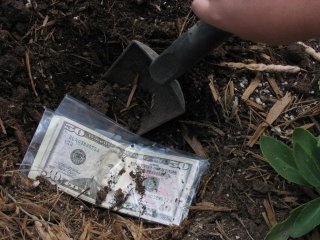Talents in the Ground (a Rationale)
So why bury my $100? Actually, to my way of thinking, it’s the Bible’s fault:
For it is as if a man, going on a journey, summoned his slaves and entrusted his property to them; to one he gave five talents, to another two, to another one, to each according to his ability. Then he went away. The one who had received the five talents went off at once and traded with them, and made five more talents. In the same way, the one who had the two talents made two more talents. But the one who had received the one talent went off and dug a hole in the ground and hid his master's money. Matt. 25:14-18
Over the years I’ve noticed that Scripture tends to take the side of underdogs—shepherd boys, an unwed pregnant teen, the jilted women and crippled men. After so much exposure to this mind-boggling anti-heroism it has become my own pattern. When I read one of Jesus’s parables, I reflexively start to see things from failure’s side…
The guy who built his house on the sand was probably in too big of a hurry to get a roof over his head to do much site investigation, a mistake any doofus with a dream and poetential oceanfront view could make. At least he wasn’t one of those weekend carpenters, full of promises who never ever really gets things done. This guy set to with his hammer and he built himself a house—for as long as it lasted.
And the man who stored up all that grain in the barn and then died without benefiting from it. I want to at least give him credit for being a really good manager of crop yields. He was not a lazy grasshopper; he was just an ant for whom this time the clock ran out.
The prodigal son? Is it so awful that he refused to be a good boy and stay with his father and older brother? If he had, I imagine him feeling a lifelong dissatisfaction sitting on the porch as the sun went down each day. Perhaps the prodigal was like someone I know too well who could not initially swear loyalty to God, much less the church. The young man I’m thinking of first had to find out for himself, experientially not theoretically, that the grass truly is not greener on the other side. In fact, he learned that a steady diet of verdant vegetation will infest your soul with worms.
Maybe I just want to give these sorts of illustrative biblical failures and foul-ups a second chance because I sympathize. I still need a daily shot at starting over and getting things right with God. Call it my keen reliance on the divine do-over. Amen.
When it comes to the parable of the talents, it’s not that I desire to fully emulate the unwise slave. After all, when the master returned this slave received a horrible rebuke, even eternal condemnation (“cast into outer darkness”).
What drives my madness and my back yard digging is that I think I know this erring slave a little bit. I know his fear of doing the wrong thing and how it can make him so falsely prudent that he sees a hole in the ground as his best ally. Better to mess up there in the shadows and the dirt than out in public where if he loses all the master’s money everyone will see his out-turned pockets and the glaring shame reddening his face.
I suppose it’s possible too that he might have imagined he would dig the money up in time to find some way to gain a return before it was too late. He might have even thought he was composting his options, that they would ripen in the soil of his subconscious and one day he would be ready to open the hole, pull out his stash of coins and finally invest wisely on behalf of his master. But perhaps he never got around to acting upon his plans. Or the inspiration failed to come before time ran out.
The hole in the ground, and the waiting that goes with it, is a definite risk.
I’d better have something to do with this money by June 1.

